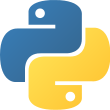 Language
Language
- Python 3
 Reading time
Reading time
- Approximately 32 days
 What you will learn
What you will learn
- Programming Basics and Python Syntax
- Audio and Music
- Raspberry Pi
 Author
Author
- Ryan Heitz
 Published
Published
- 10 years ago
Summary
A fun and imaginative way for kids and other beginners to take their first steps programming on a Raspberry Pi.
Purchase of the print book includes a free eBook in PDF, Kindle, and ePub formats from Manning Publications.
About the Technology
The Raspberry Pi is a small, low-cost computer invented to encourage experimentation. The Pi is a snap to set up, and using the free Python programming language, you can learn to create video games, control robots, and maybe even write programs to do your math homework!
About the Book
Hello Raspberry Pi! is a fun way for kids to take their first steps programming on a Raspberry Pi. First, you discover how to set up and navigate the Pi. Next, begin Python programming by learning basic concepts with engaging challenges and games. This book gives you an introduction to computer programming as you gain the confidence to explore, learn, and create on your own. The last part of the book introduces you to the world of computer control of physical objects, where you create interactive projects with lights, buttons, and sounds.
What's Inside
About the Reader
To use this book, you'll need a Raspberry Pi starter kit, keyboard, mouse, and monitor. No programming experience needed.
Table of Contents
- Meet Raspberry Pi
- Exploring Python
- Silly Sentence Generator 3000: creating interactive programs
- Norwegian Blue parrot game: adding logic to programs
- Raspi's Cave Adventure
- Blinky Pi
- Light Up Guessing Game
- DJ Raspi
PART 1 GETTING STARTED 1
PART 2 PLAYING WITH PYTHON
PART 3 PI AND PYTHON PROJECTS
APPENDIXES
- Raspberry Pi troubleshooting
- Raspberry Pi ports and legacy boards
- Solutions to chapter challenges
- Raspberry Pi projects
